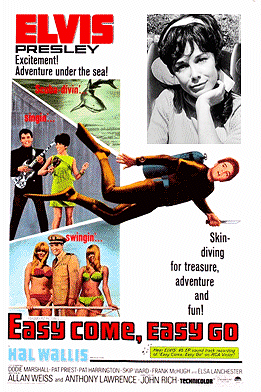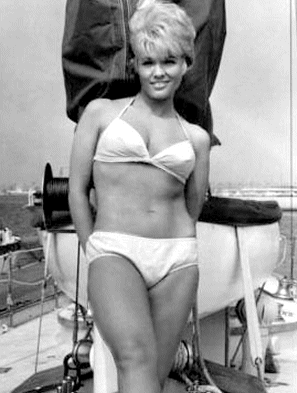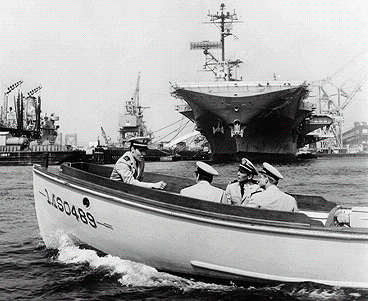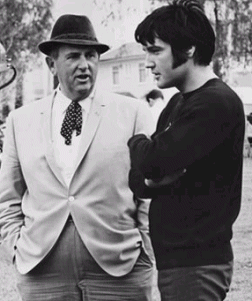Sixties
City presents
a wide-ranging series of
articles on all aspects of the Sixties, penned by the creator of the iconic
60s music paper Mersey
Beat
|
Sixties
City presents
a wide-ranging series of
articles on all aspects of the Sixties, penned by the creator of the iconic
60s music paper Mersey
Beat
|
|||||
|
 |
This
was the last Elvis movie Hal Wallis was involved in. He had tired of
the chain of lightweight films and told director John Rich, “Just put
them through their paces", at the same time also reducing the budget.
Wallis, it seems, was becoming disenchanted of the movie-Elvis he’d created and made comments about his star’s weight, saying “the costumes get tighter and our hero looks fatter and fatter". He also commented on the Elvis hairstyle, saying, “If he comes up from underwater, takes his helmet off and discloses that perfectly combed pompadour the whole picture will be ridiculous". This feeling was not confined to Wallis. Freddie Bienstock, who was responsible for producing the songs, said: “It was like a factory – there was no way to get better songs, we just went from one film to the next". In fact, Paramount didn’t really want to release the film and only did so at Colonel Parker’s insistence – and the movie didn’t even cover its costs. It was to be the last film Elvis made for Paramount. When asked to comment on the film, Elvis said, “Same film, different location". Written by Allan Weiss and Anthony Lawrence, the movie had several different working titles: ‘Port of Call’, ‘A Girl In Every Port’, ‘Nice And Easy’ and ‘Easy Does It'. The cast included: Ted Jackson (Elvis Presley); Jo Symington (Dodie Marshall); Dina Bishop (Pat Priest); Judd Whitman (Pat Harrington Jr); Gil Carey (Skip Ward); Madame Neherina (Elsa Lanchester); Captain Jack (Frank McHugh). This was Elvis’s 23rd film and it was released nationally in America on 22nd March 1967. During his last day on active duty in the Navy, Lieutenant Ted Jackson has to disarm an underwater mine and while doing so he sees what he believes to be a sunken ship, the ‘Port Of Call’. Jackson investigates and discovers a treasure chest which he believes is full of gold coins. He decides to investigate and asks Jo Symington, a go-go dancer and yoga student, who is the grand-daughter of the owner of the ship, if he could see the ship’s manifest. After examining it he is certain that the ship was carrying treasure and when he is released from active duty he asks his former business partner Judd Whitman to help him in salvaging the treasure. Although Judd contributes a thousands dollars towards paying for the equipment, they are still short of some of the equipment they need. They approach Captain Jack, a local owner of a marine supply store, and offer him a share of the treasure if he’ll let them use his equipment for the salvage operation. Jack agrees, but as soon as he boards the boat they’d hired, he breaks down because he’s afraid of the sea. Since they need three people to help in the salvage operation Judd enlists the help of Jo. This doesn’t please Ted as he didn’t want Jo to find out the reason he wanted to see the ship’s manifest. When he has to tell her that he needed to see the manifest to confirm that there was treasure on board, she calls him ‘greedy’ and is upset with him, but he agrees to use the treasure to help her fund an art centre. Problems are compounded when they discover that they have been followed by two people, Dina and Gil, in a small boat who are curious about what they are up to. Having suspected what the trio were seeking, Gil pretends that their engine’s power cable is burned out and asks to be towed back to port. |
 |
 |
Once there, Gil tells Captain Jack that Ted is trying to poach treasure
that really belongs to them, so Jack takes the equipment from Ted and rents
it to Gil instead. Ted tries to explain to Jack, but he then refuses to let either of them use the equipment. Gil and Dina then kidnap Jack and steal the equipment and when Ted finds them gone he sets out in pursuit, accompanied by Jo and Judd. They arrive to find Dina and Gil already diving for the treasure, but Ted defeats Gil underwater and secures the treasure chest. However, when they take it to a collector to assess its worth they are told the coins are only copper ones, worth 30 cents each. The collector pays them $3,900 which they use as a down payment for an art centre for Jo and then hold a benefit concert to raise further money for the project. This was the least successful soundtrack of Elvis’s movies. It didn’t chart and only sold 30,000 copies when released as a six track E.P. It was also his last E.P. to be released. The soundtrack was recorded at Radio Recorders Studio in Hollywood in September 1966. the musicians were: Elvis Presley, vocals; The Jordanaires, backing vocals; Scotty Moore, Tiny Timbrell, Charlie McCoy, guitars; Bob Moore, Jerry Sheff, bass; D. J. Fontana, Buddy Harman, Hal Blaine, drums; Michael Rubini, piano; Anthony Terran, William Hood, Mike Henderson, Butch Parker, horns. It was issued on RCA EPA-4387 on 24th March 1967 and the tracks were: Side One: ‘Easy Come, Easy Go’; ‘The Love Machine’ ; ‘Yoga Is As Yoga Does’. Side Two: ‘You Gotta Stop’; ‘Sing You Children’ ; ‘I’ll Take Love'. ‘Easy Come, Easy Go’ (written by Sid Wayne and Ben Weisman) was sung over the opening credits ‘The Love Machine' (written by Gerald Nelson, Fred Burch and Chuck Taylor) was sung at the Easy Go-Go club ‘Yoga Is As Yoga Does’ (written by Gerald Nelson and Fred Burch) is sung as a duet with Elsa Lanchester during a yoga session ‘You Gotta Stop’ (written by Bill Grant, Bernie Baum and Florence Kaye) is sung in the Easy Go-Go club ‘Sing You Children’ (written by Gerald Nelson and Fred Burch) is sung at Jo Symington’s party ‘I’ll Take Love’ (written by Dolores Fuller and Mark Baker) is sung at the Easy Go-Go club |
 |
|
Article
Text
UK
web hosting by
|